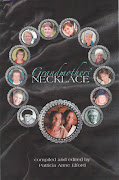___________________________________________
Dear Great-Aunt Michelena or maybe I should call you Вуйна,
Ever since I saw your photograph and heard your heart-rending story, I have been obsessed with finding traces of your short life. The journey has been frustrating as women are much harder to track. Invisible threads in our past history. My history.
Michalena, you were about 13 years younger than your older sister, my grandmother Marya Zarecka. Before I knew the exact age difference, I wondered if you might be her illegitimate daughter and the reason behind my grandfather's relentless anger towards his wife. One day I asked my mother timidly if that could be possible. "No!" she stated, "they were sisters." I believe you were.
You were born in 1893 in the village of Repuzhintsy, province of Bukovina when it was part of Roumania, in the Austro-Hungarian Empire. You were 18 when Marya left for Canada to join my grandfather in 1911 with her two children Helena and Anton. Maybe you came with her or followed later. I have not found your immigration records yet.
Your brother Iwan (John) immigrated to Winnipeg with his family in 1914. You went to Winnipeg and, according to the Henderson Directory, by 1916 you were living in Ben Nevis House, a rooming house at 42 Dagmar Street. Like so many hundreds of other young single immigrant women, you were working in one of the many downtown Winnipeg hotels.
I have two studio photographs of Michalena, likely taken after her brother arrived in 1914. In one she is looking very proper, with her fiancé, her brothers Nikolaj, Iwan, his wife and daughter.
Your fiancé is standing beside you in the group photograph. You must have been looking forward to marrying him. You risked your life for the sake of $800 you saved and kept hidden under your mattress. Who was he? We don't even know his name, though most likely he was from your village, Repuzhintsy. Was he heart-broken when he heard the news of your death? Did he ever recover from the loss? Perhaps he married and had children. Where are his descendents now? Would they recognize him in this photograph?
 |
| Michalena Huckan, her fiancé, Nikolaj Huckan Franciszka Ross Huckan, Wladzia (Frances), Iwan (John) Huckan Winnipeg, Manitoba c. 1914 |
In the other photograph, you stand beside a table, hair flowing , looking very beautiful. I can see that you were a pretty woman, short in stature with long curly brown hair. Your eyes are lighter than brown, blue or hazel perhaps. You are wearing a long sleeved white blouse and a long dark skirt, proper formal female attire for the time. You are wearing no visible jewelry except a pin at the neck of your blouse. Your hands appear to be strong but graceful, holding a small bouquet of flowers.
 |
| Michalena Huckan Winnipeg, Manitoba c. 1914 |
Copyright © 2010, Ruth Zaryski Jackson






